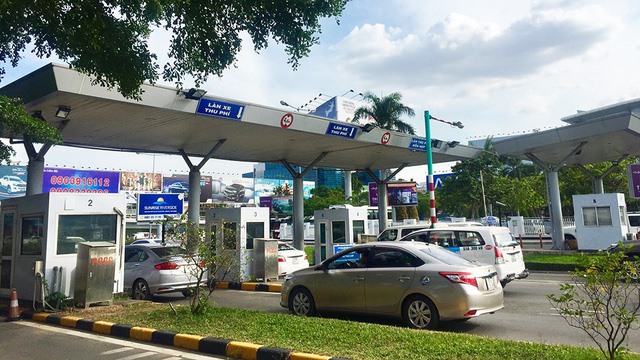 Society
Society

Tax payers are claiming they should not have to pay an entry fee for airports and terminals given the fact that airport investors do not have to pay land taxes.
 |
| Vehicles pay fees as they enter Tân Sơn Nhất International Airport. — Photo tuoitre.vn |
HCM CITY — Taxpayers are claiming they should not have to pay an entry fee for airports and terminals given the fact that airport investors do not have to pay land taxes.
Responding to the call, the Government-run Airports Corporation of Việt Nam (ACV), which has been imposing entry fees at 21 airports under its management for years, has recently asked for permission to change the way it collects service charges for the use of airports while maintaining tax incentives for airport investors.
In a report to the Prime Minister, the Ministry of Transport asked for land tax incentives to continue for investors in domestic airports, but to continue to allow the ACV to charge people entry fees to subsidise management and maintenance work.
Lại Xuân Thanh, head of the ACV’s management board, told Tuổi Trẻ (Youth) newspaper that they were waiting for the Government’s approval on the proposal.
The ACV has suggested two methods for adjusting the way it collects fees to appease disgruntled airport-goers.
The first is to allow vehicles entering airports a grace period of 10 to 15 minutes for which they do not have to pay.
However, Thanh said that it would cost investors money to set up toll booths and some drivers could take advantage of the period to cruise the airport looking for passengers.
The second suggestion, which Thanh approved of, is to cut entry fees by 30-50 per cent, but reclaim that money through passenger services charges.
Both passengers and airport-based logistics companies said that by reducing entry fees but increasing passenger services charges, it seemed like the AVC was simply splitting the charges between different departments.
The director of an airport-based logistics company said that it was irrational to charge airport entry fees because the Government did not charge investors land use taxes.
“We are charged to drive 300-400m which takes only 3-5 minutes. The minimum fee for a parking slot is VNĐ400,000 (US$18) per hour, not to mention the additional fee of VNĐ15,000 ($0.66) per time. We find it illogical,” he said.
Nguyễn Văn Thanh, head of the Việt Nam Automobile Transportation Association, shared the same opinion.
“The ACV needs to be transparent by calculating the fees based on investment. It should not be able to charge fees at its pleasure,” he said.
However, according to the MoT, the Law of Land says that land users should be able to make the most of their investments.
The ACV was managing, exploiting and maintaining airport access using its own resources, so it was only logical for it to charge fees it deemed fit.
The MoT has however asked the ACV to offer free short-stay terms in airports.
Nguyễn Văn Thư, director of the HCM City University of Communications and Transport, said that it was right to charge fees in parking lots.
“It is impossible for traffic congestion to happen when vehicles enjoy 10 to 15 minutes of fee-free as no one wants to waste their money on petrol,” he said.
Nguyễn Mạnh Hà, director of VETC Company, a provider of electronic toll collection solutions, said that collecting fee based on duration would work, and that it would take about a month for each system to be set up.
“This solution will also help to reduce traffic congestion inside airports in the long term,” he added.
Last March, the Ministry of Finance (MoF) said that taxes should be imposed for public land being used for business purposes.
The ministry said that the ACV should pay land use tax as it had constructed entry points to terminals for business purposes, and should also face fines for doing so.
According to Tuổi Trẻ, the total investment into terminal access roads at 21 airports in Việt Nam had reached VNĐ2.5 trillion ($109 million). To cover the expense, the ACV has recovered 90 per cent of the capital from passenger services charges and 10 per cent from entry fees.
From 2012 to 2015, the ACV earned nearly VNĐ551 billion ($23.7 million) by collecting entry fees at 19 out of 21 airports. The data was released by the Government Inspectorate last October. — VNS




